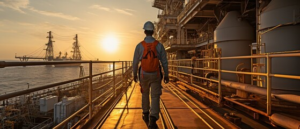Marine contractors build various coastal projects, including seawalls, groins, jetties, commercial docks, and wharves. They also rely on high-quality metocean data and tools to improve project efficiency, accuracy, and safety.
When hiring a marine contractor, look for one with stable leadership and comprehensive insurance coverage, including product liability, general liability, and workers’ compensation. This will ensure that the company can continue to operate should any unforeseen events occur. Click here to Learn More.

Marine construction is a highly specialized field that requires a high level of skill and precision. It involves working on structures that are located around water and must take into account tidal and current movements. It is therefore essential to choose a marine contractor who has the necessary experience, abilities, and reputation to get the job done right. If you’re looking for a marine contractor, be sure to research their work history and client reviews.
In addition to a specialized skillset, marine contractors must be able to adapt to quickly evolving regulations at all levels – state, federal, and international. This is particularly important in the case of environmental regulations that are linked to maritime activities. They must also be able to provide innovative, cost-effective services and solutions to improve the overall efficiency of the maritime industry.
Moreover, marine contractors must have extensive knowledge of the various areas of engineering, from design to manufacturing to construction. They also need to be able to work with advanced technology that is becoming increasingly integral to the industry. This includes software, tools, and sensors that enable them to work more efficiently.
Another challenge that marine contractors face is attracting and retaining qualified employees. This is especially challenging for companies that are relying on temporary workers to meet the demand of a growing marine construction industry. The inability to fill positions on time can lead to a loss of reputation for the company and a decline in employee morale.
One way to address this problem is by implementing strategies that promote diversity and inclusion. These strategies can help to broaden the candidate pool for marine construction jobs and encourage more women and minorities to enter the workforce. They can also help to increase employee retention by providing training and fostering a culture of safety and respect. Ultimately, these measures will help to improve the quality of marine construction projects and reduce operational risks. In addition, they can help to minimize the impact of disasters on project schedules and budgets. In the long run, this will make marine construction projects more competitive and sustainable.
Marine contractors must be licensed in order to operate, and they should maintain a high standard of quality in their work. The process of becoming a marine contractor is rigorous and requires the applicant to pass two exams and demonstrate experience with construction activities related to ocean structures.
Once a license has been obtained, the marine contractor must continue to pass regular updates and exams in order to stay current with industry standards and regulations. The marine contractor must also notify the licensing board of any changes to their contact information or business entity representative.
In addition to ensuring that all employees are properly trained, a good marine contractor will ensure that their workers’ compensation insurance is up to date. If a worker is injured on the job, this insurance provides them with the necessary financial assistance to cover their medical bills and lost wages. In many cases, the marine contractor must also have a property/general liability policy in place to protect their company in the event of damage or destruction to equipment.
Because marine contractors are working in a challenging and often hazardous environment, it’s important that they choose a reputable company with a strong track record in the industry. Choosing a company with the right experience and skills will help to ensure that your project is completed on time and within budget.
The best marine contractors will also have access to a wide variety of resources that can help them improve their overall performance. This includes software and apps that can be used to improve the efficiency of their operations, such as Sinay’s ETA prediction tools, which can reduce downtime due to weather or other factors.
The key to success for marine contractors is in the ability to adapt and change with fast-changing industry requirements at all levels (local, state, federal, and international), including those related to environmental concerns. In order to keep pace with these challenges, marine contractors need a partner that can provide them with the metocean data and state-of-the-art tools they need to work smarter. This will allow them to deliver better services/solutions and become more sustainable in the long run.
Marine contractors can face a variety of risks when engaging in commercial and residential construction on the waterfront. Specialized risk control and loss mitigation practices can help safeguard investments. However, unforeseen events can still occur and threaten business profitability. A marine contractor insurance policy can offer a safety net that prevents financial catastrophe and keeps projects on schedule and on budget.
Depending on the type of work performed, a marine contracting company may require different types of insurance coverage. Generally speaking, marine construction workers are required to carry general liability protection and product and completed operations coverage. This will protect the business in the event that an employee is injured on-the-job, property is damaged and/or a customer is dissatisfied with the results of work.
In addition to these policies, marine contractors are also often required to carry a Longshore and Harbor Workers Compensation) policy. This coverage will protect employees if injured on the job and helps them maintain income in the event of a serious injury or illness. The cost of this policy is typically determined based on payroll at the time the policy is written and will be reflected in the deposit premium.
The specialized nature of the work that marine contractors perform requires that they be cautious to avoid creating any type of pollution that could negatively affect the environment or their clients. This can include an oil spill, accidental disposal of contaminated soil or even the spillage of paint, solvents or other chemicals on the job. It is important for marine contractors to have insurance protection that will pay for cleanup and restoration if a pollution incident occurs.
There are a few insurance providers that specialize in offering insurance programs designed for marine contractors. Some of these insurers have developed marine contractor policies that provide all the necessary coverages in one package. This includes workers compensation, inland marine and commercial auto, as well as a variety of other property and casualty coverages. These policies may also feature a bumbershoot coverage that acts like a commercial umbrella policy to provide additional liability protection above the underlying limits of the marine insurance policy. This may also include hull coverage for the equipment and machinery that is owned by the marine contractor.
The right marine contractor can make a significant difference in the construction and maintenance of waterfront structures. They can help you repair docks, piers, and bridges, as well as install or replace boat lifts and other equipment. Marine contractors can also help with environmental management and regulatory compliance. If you’re looking for a reputable marine contractor, be sure to find one with specialized training in the specific project you need done.
Professional branding is a must-have for any marine company seeking to attract new customers. A marine marketing agency can create a custom logo and brand identity that will set your business apart from competitors, attracting customers and increasing sales. The agency can also develop a marketing strategy that will get your message heard by potential customers online. This can include social media posts, search engine optimization (SEO), and email and direct mail campaigns.
In addition to branding, marine marketing agencies can also create promotional materials, such as flyers and brochures, that will give potential customers a look at your company and its products and services. These materials can be used at boat shows and other events. They can also be placed on the company’s website.
Digital marketing is another important part of any marine business’s marketing strategy. A marine digital marketing agency can help you get your message heard by more people on popular social media platforms and search engines. The agency can also help you increase the number of qualified leads and sales you generate through your website.
Marine SEO is a vital component of any marine business’s marketing strategy. It helps your business rank higher on search engines, bringing in more organic traffic and allowing you to connect with more prospective clients. Marine SEO experts can also help you create a comprehensive marketing plan that will boost your sales and brand awareness.
A 35+ year marine marketing veteran, Wanda Kenton Smith is a trained journalist who’s held positions as editor of two consumer and two trade boats magazine; vice president of a major independent marine manufacturer with global brand responsibilities; and owner and publisher of her own 20 million-dollar multi-award-winning national PR firm with clients ranging from small local businesses to Fortune 500 corporations. She’s a regular contributor to Boating Industry, Soundings Trade Online, and several other publications and has edited three books and published more than 500 by-lined articles.

